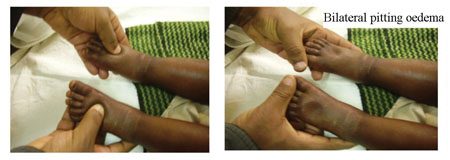5.5.1 Checking for bilateral pitting oedema in a child
In order to determine the presence of oedema, you should apply normal thumb pressure on both feet for three seconds (count the numbers 101, 102, 103 in order to estimate three seconds without using a watch). If a shallow print persists on both feet, then the child has nutritional oedema (pitting oedema). You must test for oedema with finger pressure (see Figure 5.10) because you cannot tell by just looking.

Grades of oedema
Depending on the presence of oedema on the different levels of the body it is graded as follows. An increase in grades indicates an increase in the severity of oedema.
0 = no oedema
+ = Below the ankle (pitting pedal oedema)
++ = Pitting oedema below the knee
+++ = Generalised oedema.
5.5 Clinical methods of assessing nutritional status
